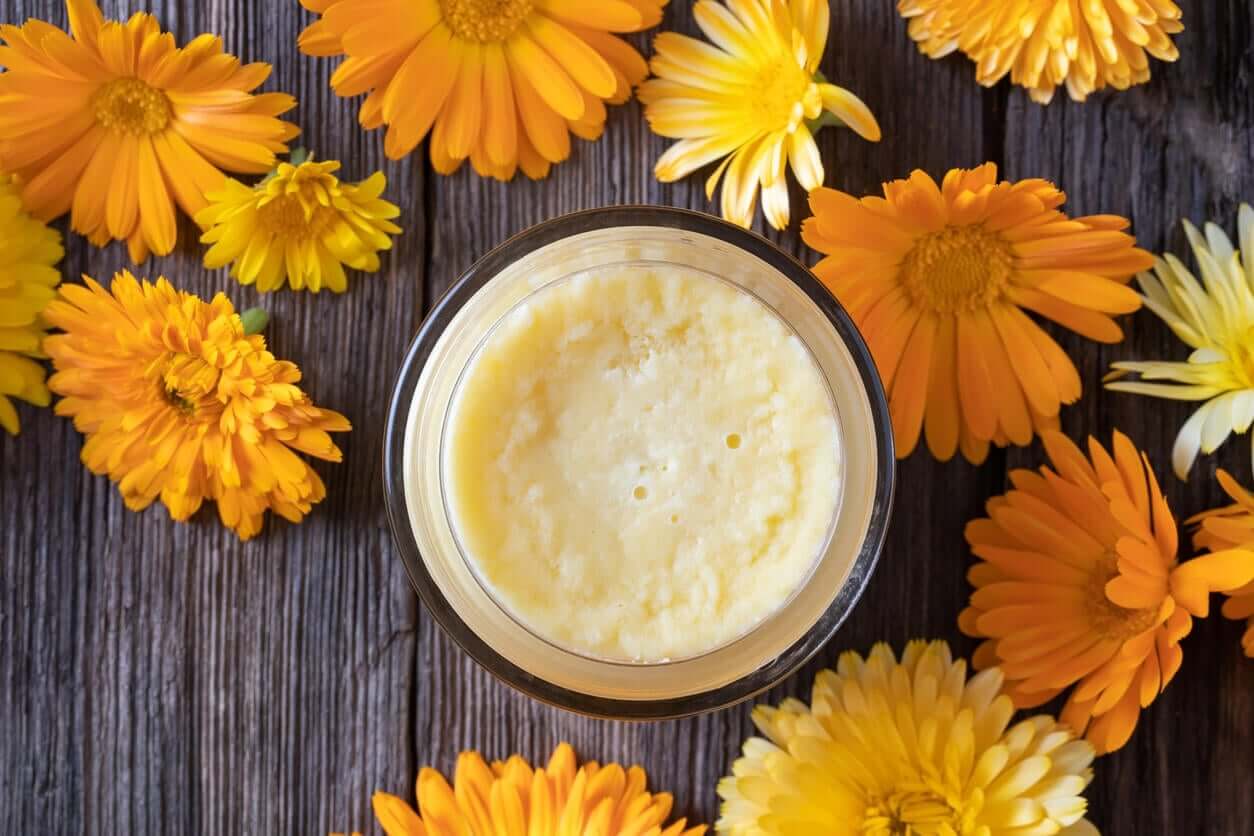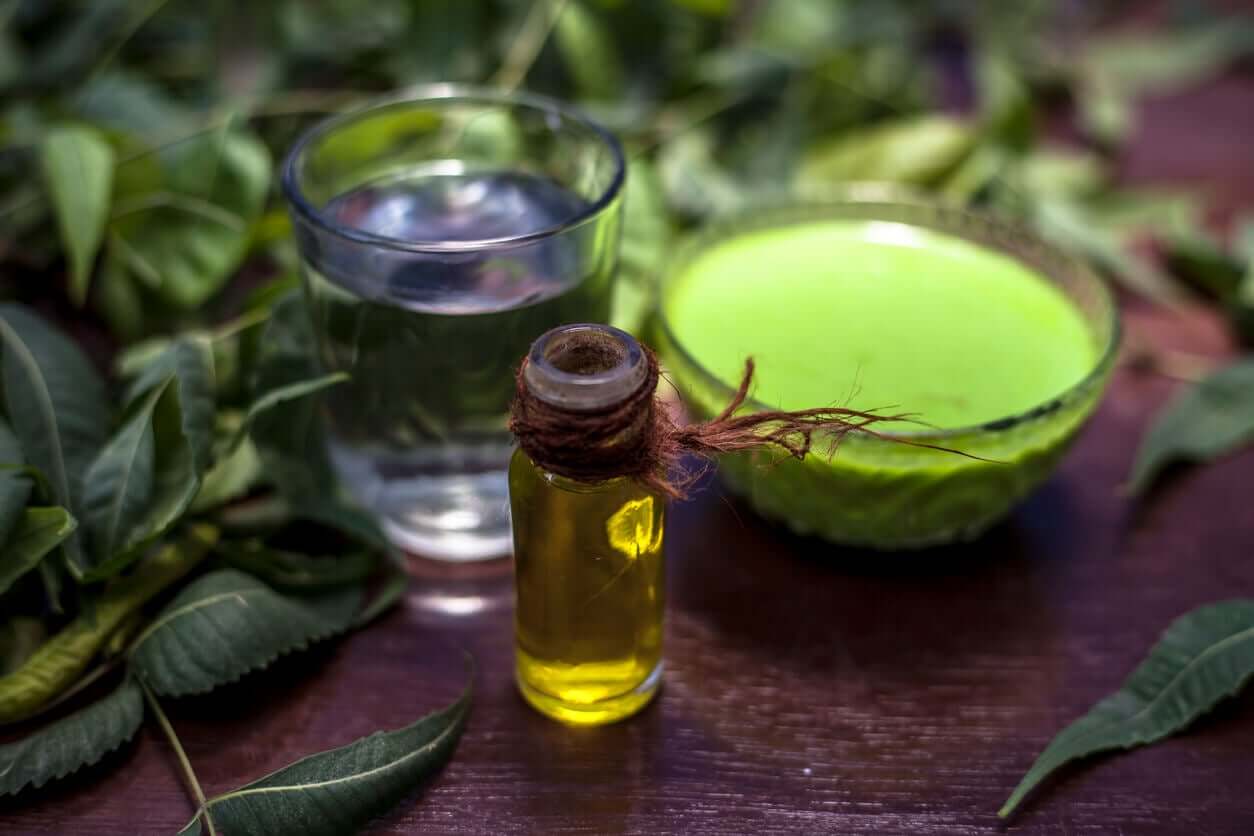10 Natural Remedies for Atopic Skin in Babies


Written and verified by the dermatologist Maria del Carmen Hernandez
There are several natural remedies for atopic skin in babies, although not all are suitable for use with little ones.
Atopic dermatitis is one of the most common skin diseases in childhood and for that reason, we’re going to tell you about some non-pharmacological alternatives to combat it. Keep reading!
What is atopic skin in babies?
Atopic dermatitis is a chronic and recurrent skin disease, extremely common in infants. It’s characterized by skin irritation (eczema) that occurs as a result of direct contact with aggressive substances for this delicate tissue.
It’s a serious social, clinical, and economic problem. In fact, it influences the quality of life of affected children and their families. Up to 80% of infants with atopic skin have been shown to have sleep disturbances and periodic episodes of anxiety and irritability.
The location of the lesions varies according to the age of the children, as well as the forms in which it manifests itself. Among them, the following signs and symptoms stand out:
- Pruritus (itching)
- Xerosis
- Peeling
- Redness
Some natural remedies to improve atopic skin in babies
The most common symptoms among babies are redness and itching, for which the following non-drug recipes can be implemented. Take note!
1. Calendula

Calendula creams are used to promote healing and treat some skin conditions, including eczema. In addition, it helps to reduce inflammation, eliminate bacteria, and improve the appearance of the skin.
Ideally, use creams with these natural extracts and without added chemicals, as they can further irritate the delicate skin of infants.
2. Short, warm baths
In babies with atopic skin, it’s best to avoid bathing too often. In fact, the vast majority of little ones need to bathe once or twice a week.
When bathing your child, it’s important to take into account the following tips: Use mild cleansers or syndets, immerse the baby in warm water for 10 to 15 minutes, and dry their skin without producing friction with a cotton towel.
3. Aloe vera gel
This cosmetic is a derivative of the plant of the same name that’s used to soothe ailments or as post-sun care for severe burns.
According to a scientific study, aloe vera gel has the following properties:
- Wound healing
- Immune system stimulant
- Antimicrobial
- Antibacterial
4. Probiotics
Treatment with probiotics attempts to maintain a balance between the bacteria in the body, as it encourages the development of a healthier intestinal flora.
In this sense, the administration of Lactobacillus GG in babies usually reduces the development and evolution of atopic skin. However, this effect isn’t immediate and it requires sufficient time to cause the turnover of said microorganisms.
5. Sunflower oil
Babies with atopic skin have a probable deficiency in essential fatty acids, which can be treated with the topical application of sunflower oil. This compound is easily absorbed through the skin and is highly rich in essential fatty acids.
In babies with mild atopic dermatitis, sunflower oil is very effective and helps reduce the severity of the disease.
6. Borage
Borage is derived from seeds rich in essential omega-6 fatty acids. Used topically, it relieves eczema-related discomfort and improves atopic skin in babies. There are even studies that show its effectiveness for the treatment of seborrheic dermatitis, due to its great moisturizing power.
7. Evening primrose oil
Like borage, evening primrose oil has high levels of gamma-linolenic acid, omega-6 and 3 fatty acids, and vitamin E. All of these components nourish and hydrate the skin and maintain a proper moisture balance.
In turn, this oil has the ability to reduce the discomfort caused by some superficial skin lesions, thanks to its natural anti-inflammatory properties.
Read also: 15 Tips for Dealing with Atopic Dermatitis in Children
8. Oatmeal baths, one of the most well-known natural remedies for treating atopic skin in babies
Colloidal oatmeal, also known as ground oatmeal, is often used to soothe itching and irritation of the skin’s surface. In addition, it reduces inflammation and normalizes the pH of the skin.
An oatmeal bath is a cheap and simple method to try to soothe the discomfort of atopic dermatitis. According to a study published in 2020 by the Journal of Drugs in Dermatology, this food improves the composition of the microbiome and repairs defects in the skin barrier.
9. Melaleuca alternifolia
Tea tree oil from the leaves of Melaleuca alternifolia has been used in recent times to treat different skin conditions, including eczema.
Its effectiveness is based on its antibacterial, healing, and anti-inflammatory properties. In addition, this compound helps to relieve itching and dryness of the skin

10. Coconut oil
Coconut oil is listed as an effective moisturizer, but it also contains certain antibacterial properties that reduce the chances of superinfection of eczema.
Tips to prevent atopic skin in babies
There are different care measures to preserve the protective barrier of the skin and keep this tissue functional. Although the causes of atopic disease are varied, it can be prevented with the following strategies:
- Constant moistening: Moistening helps maintain the proper hydration state of the skin’s surface.
- Cleaning the skin: Regular diaper changes help keep the skin dry and free from maceration or dermatitis.
- The use of suitable products: Such as syndets or neutral pH soaps and hypoallergenic products that are free of fragrances, colorants, or alcohol.
It’s worth clarifying that you need to take special care when spreading oils or creams on children’s skin, as it makes them more slippery and increases the risks of falls.
There are several natural remedies for atopic skin in babies, although not all are suitable for use with little ones.
Atopic dermatitis is one of the most common skin diseases in childhood and for that reason, we’re going to tell you about some non-pharmacological alternatives to combat it. Keep reading!
What is atopic skin in babies?
Atopic dermatitis is a chronic and recurrent skin disease, extremely common in infants. It’s characterized by skin irritation (eczema) that occurs as a result of direct contact with aggressive substances for this delicate tissue.
It’s a serious social, clinical, and economic problem. In fact, it influences the quality of life of affected children and their families. Up to 80% of infants with atopic skin have been shown to have sleep disturbances and periodic episodes of anxiety and irritability.
The location of the lesions varies according to the age of the children, as well as the forms in which it manifests itself. Among them, the following signs and symptoms stand out:
- Pruritus (itching)
- Xerosis
- Peeling
- Redness
Some natural remedies to improve atopic skin in babies
The most common symptoms among babies are redness and itching, for which the following non-drug recipes can be implemented. Take note!
1. Calendula

Calendula creams are used to promote healing and treat some skin conditions, including eczema. In addition, it helps to reduce inflammation, eliminate bacteria, and improve the appearance of the skin.
Ideally, use creams with these natural extracts and without added chemicals, as they can further irritate the delicate skin of infants.
2. Short, warm baths
In babies with atopic skin, it’s best to avoid bathing too often. In fact, the vast majority of little ones need to bathe once or twice a week.
When bathing your child, it’s important to take into account the following tips: Use mild cleansers or syndets, immerse the baby in warm water for 10 to 15 minutes, and dry their skin without producing friction with a cotton towel.
3. Aloe vera gel
This cosmetic is a derivative of the plant of the same name that’s used to soothe ailments or as post-sun care for severe burns.
According to a scientific study, aloe vera gel has the following properties:
- Wound healing
- Immune system stimulant
- Antimicrobial
- Antibacterial
4. Probiotics
Treatment with probiotics attempts to maintain a balance between the bacteria in the body, as it encourages the development of a healthier intestinal flora.
In this sense, the administration of Lactobacillus GG in babies usually reduces the development and evolution of atopic skin. However, this effect isn’t immediate and it requires sufficient time to cause the turnover of said microorganisms.
5. Sunflower oil
Babies with atopic skin have a probable deficiency in essential fatty acids, which can be treated with the topical application of sunflower oil. This compound is easily absorbed through the skin and is highly rich in essential fatty acids.
In babies with mild atopic dermatitis, sunflower oil is very effective and helps reduce the severity of the disease.
6. Borage
Borage is derived from seeds rich in essential omega-6 fatty acids. Used topically, it relieves eczema-related discomfort and improves atopic skin in babies. There are even studies that show its effectiveness for the treatment of seborrheic dermatitis, due to its great moisturizing power.
7. Evening primrose oil
Like borage, evening primrose oil has high levels of gamma-linolenic acid, omega-6 and 3 fatty acids, and vitamin E. All of these components nourish and hydrate the skin and maintain a proper moisture balance.
In turn, this oil has the ability to reduce the discomfort caused by some superficial skin lesions, thanks to its natural anti-inflammatory properties.
Read also: 15 Tips for Dealing with Atopic Dermatitis in Children
8. Oatmeal baths, one of the most well-known natural remedies for treating atopic skin in babies
Colloidal oatmeal, also known as ground oatmeal, is often used to soothe itching and irritation of the skin’s surface. In addition, it reduces inflammation and normalizes the pH of the skin.
An oatmeal bath is a cheap and simple method to try to soothe the discomfort of atopic dermatitis. According to a study published in 2020 by the Journal of Drugs in Dermatology, this food improves the composition of the microbiome and repairs defects in the skin barrier.
9. Melaleuca alternifolia
Tea tree oil from the leaves of Melaleuca alternifolia has been used in recent times to treat different skin conditions, including eczema.
Its effectiveness is based on its antibacterial, healing, and anti-inflammatory properties. In addition, this compound helps to relieve itching and dryness of the skin

10. Coconut oil
Coconut oil is listed as an effective moisturizer, but it also contains certain antibacterial properties that reduce the chances of superinfection of eczema.
Tips to prevent atopic skin in babies
There are different care measures to preserve the protective barrier of the skin and keep this tissue functional. Although the causes of atopic disease are varied, it can be prevented with the following strategies:
- Constant moistening: Moistening helps maintain the proper hydration state of the skin’s surface.
- Cleaning the skin: Regular diaper changes help keep the skin dry and free from maceration or dermatitis.
- The use of suitable products: Such as syndets or neutral pH soaps and hypoallergenic products that are free of fragrances, colorants, or alcohol.
It’s worth clarifying that you need to take special care when spreading oils or creams on children’s skin, as it makes them more slippery and increases the risks of falls.
All cited sources were thoroughly reviewed by our team to ensure their quality, reliability, currency, and validity. The bibliography of this article was considered reliable and of academic or scientific accuracy.
- Knoell KA, Greer KE. Atopic dermatitis. Pediatr Rev. 1999 Feb;20(2):46-51; quiz 52. doi: 10.1542/pir.20-2-46. PMID: 9989110.
- Leung DY, Bieber T. Atopic dermatitis. Lancet. 2003 Jan 11;361(9352):151-60. doi: 10.1016/S0140-6736(03)12193-9. PMID: 12531593.
- Braun F, Lachmann D, Zweymüller E. Der Einfluss eines synthetischen Detergens (Syndet) auf das pH der Haut von Säuglingen [Effect of a synthetic detergent (Syndet) on the pH of the skin of infants]. Hautarzt. 1986 Jun;37(6):329-34. German. PMID: 3087911.
- Verallo-Rowell VM, Dillague KM, Syah-Tjundawan BS. Novel antibacterial and emollient effects of coconut and virgin olive oils in adult atopic dermatitis. Dermatitis. 2008 Nov-Dec;19(6):308-15. PMID: 19134433.
- Akhtar N, Zaman SU, Khan BA, Amir MN, Ebrahimzadeh MA. Calendula extract: effects on mechanical parameters of human skin. Acta Pol Pharm. 2011 Sep-Oct;68(5):693-701. PMID: 21928714.
- Capone K, Kirchner F, Klein SL, Tierney NK. Effects of Colloidal Oatmeal Topical Atopic Dermatitis Cream on Skin Microbiome and Skin Barrier Properties. J Drugs Dermatol. 2020 May 1;19(5):524-531. PMID: 32484623.
This text is provided for informational purposes only and does not replace consultation with a professional. If in doubt, consult your specialist.








